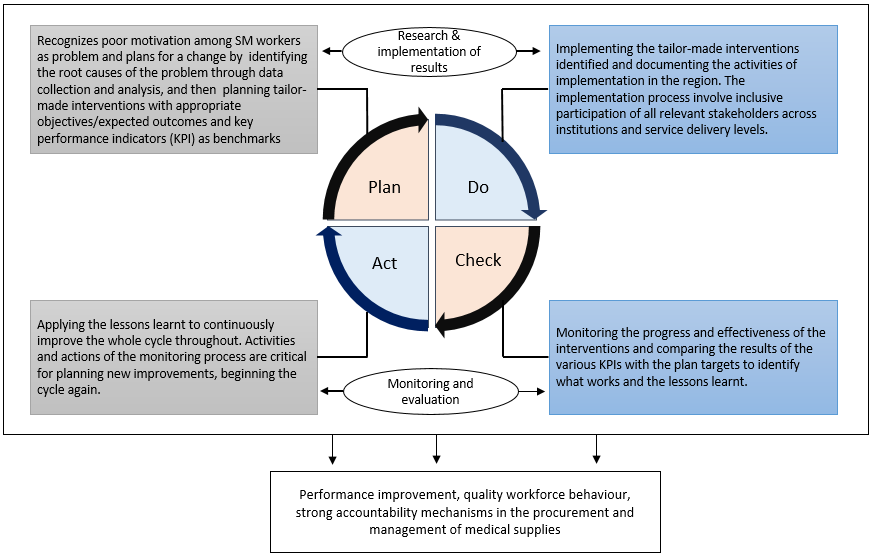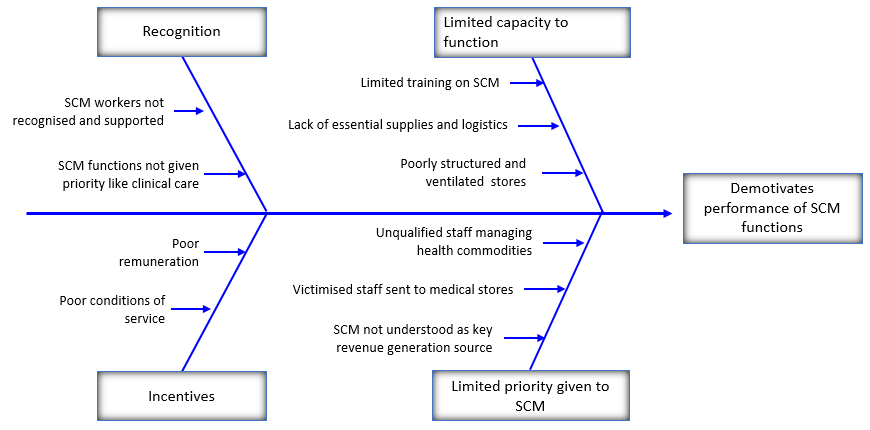This partnership seeks to strengthen teaching and research capabilities in SCM through the university’s School of Public Health and the Business School; to improve human resource skills and governance structures within the regional public health supply chain and to ensure availability of commodities at health care facilities. Previous performance data revealed some gaps and challenges among those working in the public health supply chain that limit access to medicines. Under this MoU, the University of Ghana designed and conducted operational research to determine the level of motivation of the health supply chain workers in the Northern region to begin addressing barriers to delivering effective supply chain services within and across service delivery levels.
The field data collection exercise took place in March 2019 and involved 233 personnel from the Regional Medical Stores (RMS), the teaching hospital, regional hospital, the regional and district health directorates and selected health facilities within the region. Participants were purposively selected based on their role in supply chain management. Survey questions covered a range of factors affecting supply chain performance; including financial incentives, access to skills building opportunities, exposure to pre-service training in SCM, recognition and appreciation, the capacity to function at work, inclusive decision making, healthy workplace climate, interpersonal trust and support from leadership.
This data collection exercise is the first of a set of studies which will be undertaken under the MoU and it adopted the plan-do-check-act (PDCA) model for continuous quality improvement (Swamidass, 2000).

Above: Implementation approach: Plan-do-check-act cycle (PDCA)
The findings from the research revealed gaps easily fixed – such as aligning job descriptions to supply chain roles, orienting newly posted staff and poorly qualified staff, and addressing the lack of tailor-made capacity building programs – to more complex ones like a lack of systems for performance-driven incentives. The study results will be used to develop region-specific interventions for the improvement of supply chain workforce functions and productivity. Results have been classified under four (4) broad categories below:

Above: Factors affecting the performance of SCM functions in the Northern region
Based on the findings of the study, the following interventions were proposed to address gaps in motivation and challenges facing performance of SCM functions in the region: development of SCM standard operating procedures; establishing job descriptions for SCM functions, design of orientation and short refresher programs for SCM workers, and initiating performance-based incentives for SCM workers.
As part of the MoU, two students from the University’s School of Public Health completed a one-month internship with the project. To enhance their practical experience, the students had the opportunity to assist with the implementation of the project’s Monitoring, Evaluation and Learning Plan. GHSC-PSM will continue to provide internship opportunities to students from the University of Ghana who are desirous of enhancing their skills and acquiring on-the-job experience in Supply Chain Management.
GHSC-PSM in partnership with the University will disseminate the report to key stakeholders and work with them to implement interventions that target improvement in overall performance in supply chain management.
